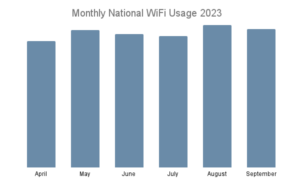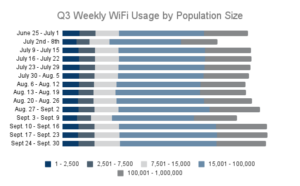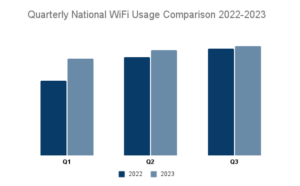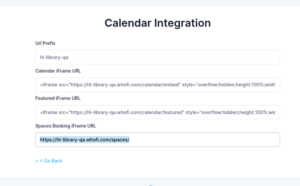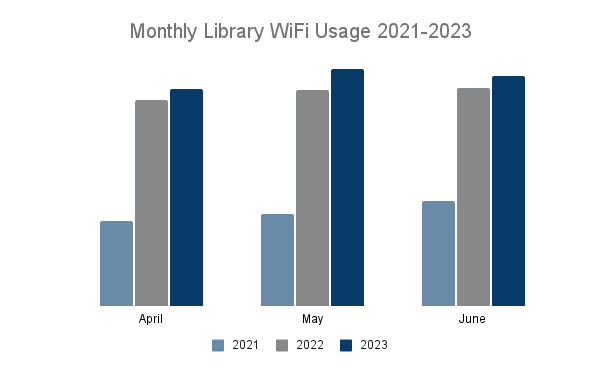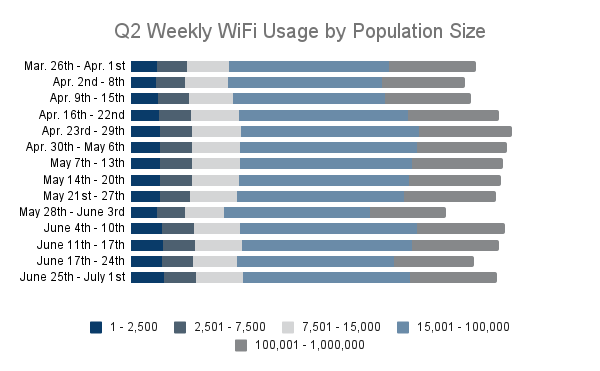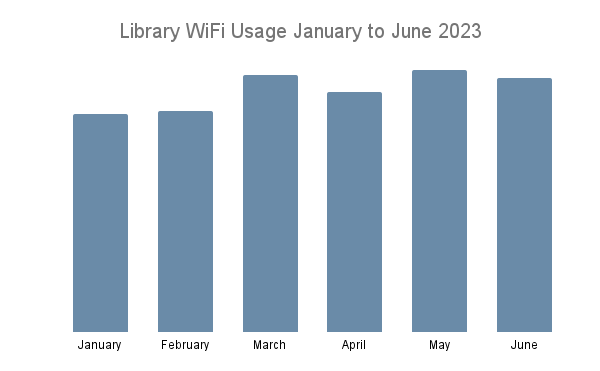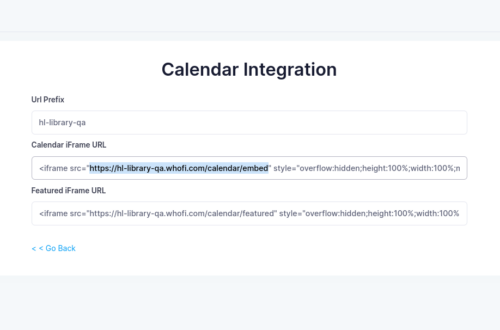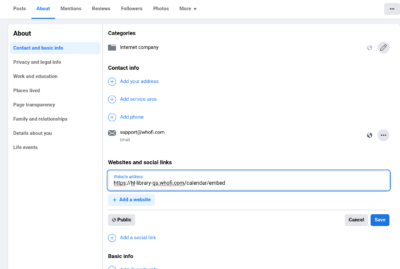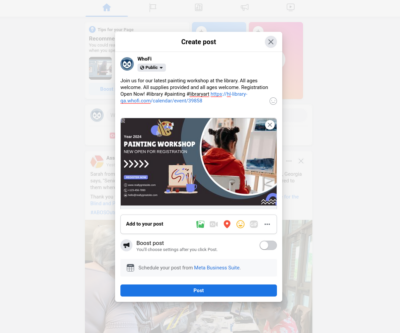How to Promote Library Services: Insights from California, Washington, and Utah
Recently it was brought to our attention that libraries in Washington, California, and Utah are successful in promoting their services. In this article, we explore the success stories of these libraries, revealing strategies and best practices for how to promote library services. Discover these resources to transform your library's promotional efforts.
Engaging the Community: Strategies that Work
Building a strong community connection is vital for successful library promotion. We hope you find something beneficial from Washington, California, and Utah as we explore their proven strategies:
Events and Workshops: Successful libraries host diverse events aligning with community interests, such as book clubs, story times, and coding workshops. Salt Lake City Public Library even offers an Introduction to Sewing program for all ages! These create inclusive spaces, encouraging active community participation.
Partnerships with Local Organizations: Collaborating with library supporting community members expands networks and leads to idea sharing. For example, Seattle Public Library partners with local businesses to help small businesses and entrepreneurs grow. This increases library visibility and provides a unique community experience.
Advocacy for the Community: Many libraries go above and beyond to secure grants to host new programs or make improvements to services or facilities. Just this month Santa Barbara Public Library secured a grant to host a series of programs surrounding sustainability and promote local resources to get involved.
- Salt Lake City Public Library - https://events.slcpl.org/events?r=thismonth
- Seattle Public Library - https://www.spl.org/programs-and-services/business-and-nonprofit
- Santa Barbara Public Library - https://www.independent.com/2024/01/04/santa-barbara-public-library-awarded-grant-for-sustainability-initiatives/
Harnessing the Power of Social Media
Libraries recognize the influential role of social media in promoting services. Platforms like Facebook, TikTok, and Instagram provide dynamic tools for engagement:
Active Social Media Presence: Maintaining an active presence allows libraries to share engaging content, fostering a sense of excitement and anticipation. Recently Solano County Library has made big waves under supervisor Mychal Threets gaining 25,000 followers for the library and spreading “library joy”.
Community Building: Social media platforms facilitate real-time discussions, feedback, and personalized interactions, building strong relationships with patrons. Many libraries even share upcoming events to their Facebook followers and offer online registration for programs.
By harnessing social media's power, libraries seamlessly connect with audiences, creating a foundation for increased community support.
- Solano County Public Library Story - https://www.marinij.com/2024/01/08/mychal-threets-works-to-spread-library-joy/
- Solano County Public Library TikTok - https://www.tiktok.com/@solanolibrary
Collaboration: Library Resources
Libraries can amplify their impact by collaborating with state library resources. There is no need to reinvent the wheel with many state libraries offering guidance and best practices for keeping things running smoothly.
Resource Sharing: State libraries from Washington and California provide a number of articles and resources for seasonal and year round programs alike. These are great resources to spark program planning creativity.
Training and Development Programs: Librarians benefit from collaborative programs, gaining fresh insights and innovative ideas for promoting services. Library Facebook Groups like Library Management Group or Library Think Tank.
State Library Associations: Networking opportunities through conferences and workshops connect librarians across the state, fostering collaboration and support. This is a great way to meet librarians that share unique challenges and solutions in your own state.
Access to Funding Opportunities: Collaboration with state library agencies opens doors to funding programs, supporting initiatives to effectively promote services. There are a number of funding opportunities listed by most state libraries.
- You can find a full list of state libraries here - https://www.lib-web.org/united-states/state-libraries/
- California State Library Program Ideas - https://www.library.ca.gov/services/to-libraries/ideas/
- Washington State Library Summer Reading - https://www2.sos.wa.gov/library/libraries/projects/summerreading/
Success Story Insights
The success stories from Washington, California, and Utah offer valuable insights into effective library promotion. By engaging the community, embracing innovative outreach, harnessing social media, and collaborating with state library resources, libraries can create thriving environments for all ages and backgrounds. As you continue to promote your own library services, we hope you can draw inspiration from these stories to make a powerful impact in your community.
If you’re looking for technology solutions to help you with the promotion and advocacy of your library, WhoFi is helping libraries across the country. WhoFi offers cutting-edge tools and solutions to analyze your library's data, understand your patrons' needs better, and tailor your promotional efforts for maximum impact. WhoFi empowers you with actionable insights to drive meaningful connections with your community. To learn more, schedule a demo by clicking the button below.
https://youtu.be/icOza4XmtjM
Library Membership Management Solutions
In the digital age fragmented and complex systems are becoming a thing of the past. In this post we will discuss library membership management challenges and present an all-in-one suite of services as a potential solution. To satisfy the goals of public library directors, we've collected insights about related challenges in conversations with partners.
Common Library Challenges:
Shared Control of Spaces: Libraries try to ensure patrons have ready access to resources without conflicts. However, promoting services to the community and managing shared spaces efficiently is often difficult.
Program Registrations: Gaining registrations for library programs is critical, yet takes time when completed on paper or over the phone. To maintain community engagement, it is essential to provide an easy and seamless process to keep programs in full attendance.
Avoiding Double Bookings: Libraries, serve as maker spaces, study areas, and program hosts, often at the same time to meet patrons' varied needs. Finding the right balance can be a challenge, and double bookings can lead to frustrations.
Library Membership Management Solutions:
Community Calendar: WhoFi's Community Calendar simplifies event scheduling and provides a central hub for library programs right on the library website, to enhance community engagement. Additionally, collecting registrations early online allows program planners to prepare proper spaces and supplies.
Spaces: WhoFi's Meeting Room management feature allows patrons to book spaces quickly and use resources efficiently. Synchronizing with the library calendar helps avoid conflicts and maximize library space utilization. Directors can approve patron reservations and send confirmation and reminder emails directly from the dashboard.
WiFi Analytics: WhoFi's WiFi Analytics provides comprehensive data about foot traffic and library WiFi usage over time making answering these questions on the state survey easy.
With WhoFi's all-in-one suite of services, directors can access efficient solutions to their library membership management challenges. Transform the future of library management with WhoFi and explore a world of possibilities for your library community. You can visit our YouTube for videos about these services, and click the button below to schedule a meeting.
https://youtu.be/jzsn05UJ5z0
2024 Library Resolutions and Library Software Solutions
As we approach 2024, libraries are gearing up for a transformative year focused on advocacy and efficiency. The New Year brings with it the perennial challenge of reporting, requiring meticulous data collection on WiFi usage, program attendance, space utilization, and more. These challenges can create bottlenecks, hindering librarians from crafting positive experiences for patrons. To overcome these hurdles, libraries are exploring comprehensive library software solutions dedicated to meeting and exceeding expectations for improved efficiency and productivity.
Library Software Solutions
Library software services stand out as a potential remedy, offering tools like a library calendar and wireless sessions software. These solutions are designed to confront survey challenges head-on, allowing librarians to redirect their focus back to the community. By automating data compilation and providing comprehensive training resources, these solutions simplify reporting tasks.This ensures that the onboarding process for new staff is seamless, maintaining the uninterrupted flow of library operations.
Leveraging Library Software for Resolutions
- Spend More Time with Patrons: By leveraging library software, librarians can allocate more time to creating positive library experiences for patrons.
- Reduce Survey Challenges: Library software solutions address survey challenges directly, streamlining reporting tasks and freeing up valuable time.
- Increase Strategic Activities: Automated data compilation from library software empowers librarians to engage in strategic activities, make data-driven decisions, and plan for a thriving future.
- Simplify Staff Onboarding: Library software ensures the onboarding process remains seamless, even in times of high staff turnover.
By embracing library software solutions, librarians can confidently pursue their New Year's goals. This not only saves time and resources but also empowers libraries to make data-driven decisions for the future. As we enter into a new year, let's embrace the future, secure in the knowledge that a successful year ahead is well within reach.
Additional Resources
- WhoFi Library Software - Discover the suite of library software services.
- WhoFi Software Reviews - Hear what other libraries have to say.
- WhoFi YouTube Channel - Check out our "Start Here" playlist to learn more!
Please reach out to WhoFi at marketing@whofi.com or click the button below if you would like to learn more. We are happy to set a meeting to discuss how we can help with your library resolutions checklist.
5 Wonderful Library Winter Program Ideas
As we head into the Winter season, public libraries across the country are preparing to offer heartwarming programs for all of their patrons. These library Winter program ideas are inspired by the creativity of other libraries, showcasing the positive impact that bringing communities together through programs can have. Looking for another program to add to your library's Winter lineup? Take inspiration from what other libraries are doing below!
Five Library Winter Program Ideas
- Winter Reading Challenge
- Keep the pages turning during winter break by launching an exciting Winter Reading Challenge for children. Sharing this program on Facebook and the library website is a great way to increase participation.
- Gingerbread House Making Program
- Gather families together for a delightful and delicious gingerbread house-making event. Watch creativity unfold and Experience the joy of the season together. Make sure to prepare enough supplies for this culinary craft by collecting registrations online.
- Gather families together for a delightful and delicious gingerbread house-making event. Watch creativity unfold and Experience the joy of the season together. Make sure to prepare enough supplies for this culinary craft by collecting registrations online.
- Drive-Thru Canned Food Drive
- Turn kindness into a winter tradition with a drive-thru canned food drive. Make it easy for your community to give
back and make a meaningful impact. Promoting drop off location on the library calendar makes it simple for donors to make their donations.
- Turn kindness into a winter tradition with a drive-thru canned food drive. Make it easy for your community to give
- Snowga Series for Adults
- Cultivate serenity and mindfulness with a meditative yoga series for the Winter months. It's a wonderful opportunity to bring a sense of warmth and tranquility to adult patrons during the winter season.
- Make Your Own Greeting Cards
- Invite patrons to unleash their creativity by crafting personalized greeting cards. Whether it’s for the holidays or just to brighten someone’s day, this hands-on activity promises joy and connection.
Simplified Program Planning, Promotion & Reporting
Effortless registration becomes a reality with effective library calendar software, allowing patrons to sign up for any exciting library Winter program with just a few clicks. Embedding program details on your library website can be simple with integration options for the library website keeping the community informed. Plus, social media sharing becomes a breeze if each event has its own unique web page. WhoFi offers Community Calendar as an all-in-one solution for programming needs at the library and amplifies the library’s event offerings all year.
Please reach out to WhoFi at marketing@whofi.com or click the button below if you would like to learn more and set a meeting to discuss simplifying the process of planning programs for the library you serve.
https://youtu.be/-3cHe2FF_fE
Public Library WiFi Sessions Q3 2023
Third Quarter 2023: Public Library WiFi Sessions and Digital Equity Trends
https://youtu.be/g6xQ8WU06Gw
The third quarter of 2023 reaffirmed the critical role public libraries play in providing equitable internet access within the communities they serve. Against the backdrop of increased Summer travel, libraries experienced noteworthy stability in library WiFi sessions. Despite increased travel among patrons, sustained usage patterns revealed the enduring importance of the essential services libraries provide, catering to the needs of the community.
Third Quarter 2023 Monthly WiFi Usage Trends
A month over month view of Library WiFi usage through the summer shows high usage through all of the summer months with May and August having the highest visitor counts. While the third quarter showed fluctuations in monthly and weekly patterns, as a whole, it showed continued growth, surpassing the previous year's figures. This achievement is particularly commendable as it aligns with the end of Summer Reading programs and sets the stage for a promising Fall season. Congratulations to libraries for their dedication to fostering community engagement and digital access as we transition into this new chapter.
Throughout the third quarter of 2023, libraries experienced consistent growth in monthly WiFi sessions, surpassing the usage recorded in 2022. From May into July, there was a gradual decline in WiFi usage, reflecting the typical decrease in demand during the early summer months. However, as the summer progressed, there was a notable resurgence in August, indicating increased community engagement and demand for digital resources.
This uptick was a testament to the success of summer programs and the libraries' ability to captivate patrons. However, with the return to school activities in September, there was a minor decrease in usage, aligning with the usual adjustments in community needs.
Summer Holiday Travel Trends
As anticipated, the third quarter saw a decline in WiFi sessions during the week of the Fourth of July and Labor Day, in line with the typical dip observed during traditional holiday periods. These brief intervals of reduced activity were counterbalanced by sustained engagement during the remaining weeks, emphasizing the libraries' remarkable resilience and adaptability. Libraries effectively met community demands, navigating fluctuating usage patterns and ensuring consistent support for patrons, despite expected lulls.
When analyzing quarterly usage between 2022 and 2023, a discernible positive trend emerged. Despite minor fluctuations, the overall usage for the quarter exceeded that of the previous year, highlighting the enduring significance of public libraries as vital hubs for digital resources and connectivity. This sustained growth reaffirms libraries' pivotal role in fostering digital equity, bridging the digital divide, and ensuring equitable access to information and technology for all members of the community.
Positive Outlook and Community Impact
As libraries forge partnerships with states to leverage BEAD funding for broadband deployment, they stand at the forefront, ready to expand connectivity and act as central information hubs for those lacking adequate access. Through a harmonious blend of engaging programs and WiFi availability, libraries have solidified their status as indispensable community resources, ensuring equal access to digital resources.
Moving forward, the numbers are clear that public libraries remain steadfast in their mission to provide equitable access to digital resources. The positive trends observed in the third quarter of 2023 reaffirm the crucial role of libraries in our communities. With the support of initiatives like the BEAD Program and the dedication of library professionals, the future holds even greater promise for enhancing digital equity and ensuring universal access to information.
What Does the Future Hold for Public Library WiFi?
The incremental growth witnessed during the third quarter of 2023 stands as a testament to the enduring dedication of libraries to address the evolving needs of their communities. Libraries persist in their pivotal role as champions of digital equity, actively bridging the digital divide, and acting as essential information access points for patrons from diverse backgrounds. This steadfast commitment underscores libraries' resolve to create an inclusive and digitally empowered society, ensuring equitable opportunities for all.
If you would like to learn more about WhoFi and how we can simplify gathering wireless sessions, program attendance, and more, please visit whofi.com/libraries or contact us at whofi.com/demo.
Adding the Meeting Rooms Booking System on the Library Website
In this post, we will be diving into the world of online room reservation systems. More specifically, we will work through integrating the Meeting Rooms booking system seamlessly into your library website. If you prefer to video format you can find video instructions at the bottom of this page!
Step 1: Setting Up the Meeting Rooms Booking System
First, log in to your WhoFi account and navigate to the Setup section. In the advanced settings, find the 'Integration' option under the Community Calendar section. You'll find the Spaces iFrame URL here which is the code you will use to begin accepting patron reservations online through Meeting Rooms.
Step 2: Integrating with Your Library Website
Now, onto your library website. Whether you are using WordPress or a similar platform, the process is straightforward. Go to the Admin section and locate the page where you want to feature your meeting rooms.
- For Buttons:
- Add a new button or edit an existing one by hovering over it and selecting the pencil icon.
- Paste the URL in the designated section and click save.
- For Hyperlinks:
- Highlight the text you want to link on your webpage.
- Select the chain link icon, paste the URL in the designated section, and click save.
By integrating this meeting rooms booking system into your library website, you are making your library spaces more accessible to patrons. We hope you are enjoying the simplicity of the Meeting Rooms booking system. By following these steps, you have streamlined the process for patrons to reserve spaces, enhancing their library experience.
We extend our gratitude to our partners whose dedication led to the creation of this system, making it easier for all libraries to manage their spaces.If you have any questions of need further assistance, our support team is just an email away at support@whofi.com. For more information and the full tutorial for Meeting Rooms you can review this previous post. Happy reading and happy reservations!
https://youtu.be/nDtUEWRoE5Q
What is Room Reservation Software for Libraries?
Due to growing demands for remote worker and community leaders, public libraries have become essential hubs offering maker spaces and study rooms. However, managing these dynamic spaces efficiently has posted significant challenges. Some directors have found a solution in room reservation software for libraries.
The Challenges:
-
Outdated Reservation Methods: Relying on handwritten notes, spreadsheets, or generic web calendars led to confusion and frustration for both library staff and patrons.
- Limited Visibility: Patrons struggled to find accurate information about room availability, leading to misunderstandings and wasted time.
- Inefficient Management: Managing room requests and program schedules manually proved to be a cumbersome task for librarians, causing inefficiencies.
- Lack of Reporting: Libraries often lacked comprehensive reporting tools, hindering their ability to analyze space utilization effectively.
The Solution:
Library Room Reservation Software simplifies the entire process, making room reservations more accessible for patrons and easier to manage for librarians. Here's what an effective room reservation software for public libraries should offer:
Patron-Friendly Booking: Empower patrons to easily view room availability, check amenities, and submit reservation requests.
- Seamless Integration: Integrate with the library’s website for a cohesive and user-friendly experience.
- Simplified Management: Enable librarians to efficiently manage room requests, program schedules, and other resources, all in one centralized place.
- Robust Reporting: Provide librarians with detailed reports designed in collaboration with libraries, simplifying the process of reporting to boards and the state.
- Integration with Library Calendar Software: Ensure seamless integration with the library’s calendar software to prevent double bookings and automatically reserve rooms for programs.
Library spaces reservation software significantly reduces the burdens associated with managing spaces effectively for both patron reservations and programs. It offers clarity and ease, benefiting both library staff and patrons alike. If you would like to learn more you can check out the video below or find more details at whofi.com/learn-more/spaces.
https://youtu.be/PkXIlDClLWY
New Product Update: Meeting Rooms for Libraries
Announcing a new service from WhoFi, Meeting Rooms serves library and community spaces by simplifying program planning and room scheduling reservations for patrons and staff. In an era of remote work and evolving community needs, libraries continue to play a crucial role by offering co-working spaces, meeting rooms, and programs that bring communities together. While libraries adapt to these changing demands, they also encounter new challenges in fulfilling these needs effectively.
Meeting New Challenges
Meeting Rooms from WhoFi helps librarians simplify these processes, offering a solution to growing library space management challenges. This intuitive service empowers patrons by providing a user-friendly platform on the library's website, allowing them to easily view available spaces, amenities, and reservation options. Say goodbye to paper forms, as patrons can conveniently reserve spaces online, reducing administrative hassles.
Calendars Unite
What sets Meeting Rooms apart is its seamless integration with WhoFi's Community Calendar service. Libraries no longer need to manage separate calendars for programming and patron spaces. When scheduling a library event that requires a specific room, the system automatically blocks off that space's availability on the library's website. This integration ensures that double bookings never happen and that the library's room scheduling is well-coordinated and accessible to all.
Empower Patrons & Staff
Utilizing Meeting Rooms from WhoFi, libraries can overcome these new challenges benefiting both patrons and staff. Patrons gain easy access to available resources, while staff members can allocate their time more efficiently, enabling them to engage more with patrons. Additionally, Meeting Rooms provides great reporting features that can aid in state surveys and advocacy.
If you're ready to simplify room reservations for your library and enhance the overall patron experience, we want to hear from you! You can schedule a demo below or visit whofi.com/learn-more/meeting-rooms to learn more. Existing partners can also check out the Meeting Rooms Tutorial Video on our YouTube Channel and below:
https://youtu.be/GlYg5RVO4b8
Q2 2023 Library WiFi Usage and Digital Equity Trends
The second quarter of 2023 continued to demonstrate the significance of public library WiFi usage in advancing digital equity and bridging the digital divide. As communities returned to a sense of normalcy following the COVID-19 pandemic, there was a slight increase in WiFi usage this quarter compared to last year. While this increase was smaller than the growth observed from 2021 to 2022, notable trends emerged, reflecting the ongoing efforts of libraries to meet changing community needs. This analysis explores the implications of the latest data, highlighting how libraries are leveraging BEAD funding to provide broadband access and their role in facilitating communication about new broadband connections.
Q2 2023 WiFi Usage and Travel Trends
During the second quarter of 2023, public library WiFi usage saw a slight increase, which was not as substantial as the growth observed from 2021 to 2022. This trend can be attributed to the gradual return to pre-pandemic norms and increased travel activities during the Summer season.
Evidence suggests that more people returned to vacation destinations this quarter compared to previous years. Despite this travel trend usage in other areas remained high as well. This could possibly be attributed to the in person programs libraries put on in full force this year. Offering engaging activities and resources to the community, engaging programs continue to draw in patrons throughout the quarter. These programs may have a role in offsetting the impact of travelers, ensuring that libraries continue to serve as essential information access points for those in the community.
BEAD Funding Deployment Preparations
Libraries across multiple states have been proactive in partnering with state authorities to develop strategies for utilizing Broadband Equity Access and Deployment (BEAD) Program funding effectively. The National Telecommunications and Information Administration (NTIA) announced funding allocations in late June providing states and localities with crucial information to start preparing budgets for broadband deployment.
BEAD funds are expected to be used to improve broadband access not only within library premises but also extending broadband coverage through their locations to reach underserved communities. Many libraries are positioning themselves as communication points to disseminate information about newly available broadband connections in their states. This proactive role further cements libraries’ status as digital equity advocates and crucial community anchors in the journey towards universal connectivity. If you would like to read more you can check out our post from earlier in the quarter, click here!
The Impact of Programs on WiFi Usage
During the second quarter of 2023 we continued to see patrons utilizing libraries and their services. Despite the Summer season being associated with increased travel and outdoor activities, libraries witnessed sustained high WiFi usage. This success may be attributed to the engaging nature of programs that attracted patrons to visit libraries regularly throughout the quarter.
Summer programs and reliable WiFi access provided by libraries continue to reinforce the role libraries play as essential sources of information, learning, and community engagement. The sustained usage during this period highlights the ongoing importance of public libraries in fostering digital literacy and connectivity.
What Does the Future Hold for Public Library WiFi?
The second quarter of 2023 reaffirmed the crucial role of public libraries in promoting digital equity and bridging the digital divide. Smaller incremental increases continue as the world returns to a new normal this quarter and libraries’ efforts to provide reliable internet and engaging communities continue to make a significant impact on their communities.
As libraries collaborate with states to utilize BEAD funding for broadband deployment, they are poised to play an even more active role in extending connectivity and serving as key information hubs for the unserved and underserved. The combination of programs and WiFi access has strengthened libraries’ positions as vital community assets, ensuring equitable access to digital resources and technology.
The future of public libraries is in good hands with libraries continuously adapting to meet evolving community needs and technology developments. By embracing the opportunities presented by the NTIA and fostering partnerships with states, libraries will continue to play a critical role in providing equitable access to the internet.
If you would like to gain easy access to WiFI insights for your library please click the button below!
How to Add Your Library Calendar to Your Library Facebook
Welcome to our step-by-step guide on integrating the Community Calendar from your WhoFi account with your public library Facebook page. This process is particularly useful for libraries without a website or the ability to make changes to their existing website. By following these instructions, you can provide your patrons with easy access to upcoming events, registration details, and opportunities to connect with program coordinators. Let's get started!
Obtaining the Integration Code from WhoFi Account
If your library doesn't frequently update its website, no need to worry! WhoFi has a solution for you.
Let's begin by accessing the admin settings of your WhoFi account and following these steps:
- Login to your WhoFi account.
- Navigate to Setup and click on the advanced section.
- Click on "Integration" to proceed.
- Copy only the URL from the integration code provided on the page.
Linking the Community Calendar to the Library Facebook
Now, you can easily integrate the Community Calendar with your library's Facebook page using
URL you obtained. Follow these instructions:
- Access the details settings of your library's Facebook page.
- Look for the "About" section and locate the "Website" option.
- Click the edit icon (pencil) next to the "Website" section.
- Paste the code from your WhoFi account into the provided field or click add a website to include a new field.
- Don't forget to save the changes before exiting the admin settings.
- Congratulations! Your patrons can now click the link on your Facebook page to view all upcoming events.
Sharing Upcoming Events on Facebook
With the Community Calendar now integrated, let's explore how to share upcoming events on your
library's Facebook page:
- Access the Community Calendar from your Facebook page or website.
- Select the upcoming event you wish to share on Facebook.
- Copy the URL from the top of your browser.
- Open a blank Facebook post and paste the copied URL into it.
- Personalize the Facebook post with a captivating title, event details, an image, and relevant hashtags.
- Click on "Post" or "Schedule" to publish the event on Facebook.
Integrating your library calendar from WhoFi with Facebook offers a convenient way for your patrons to stay informed, participate in events, and connect with program coordinators. Whether your library has regular website updates or not, WhoFi has made it simple to keep your community engaged through Facebook.
We hope this guide has been helpful, please add us on Facebook for more future updates at facebook.com/whofius! Should you have any questions or need further assistance, feel free to reach out for support at support@whofi.com or click the link below to set a demo. Happy event-sharing!



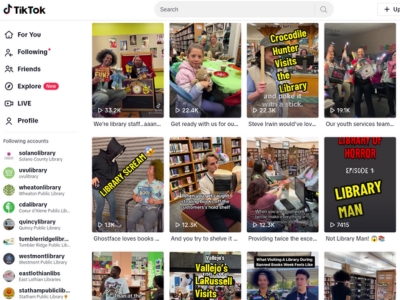





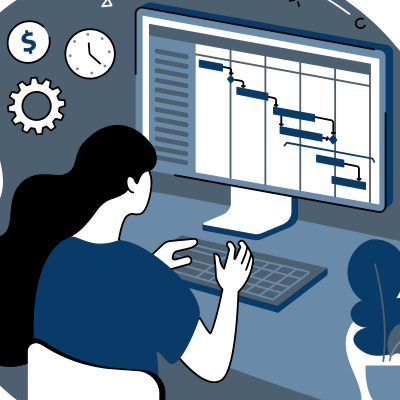
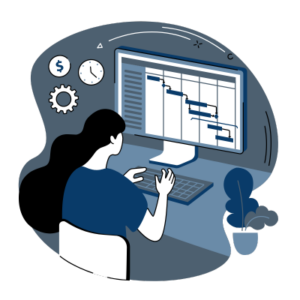
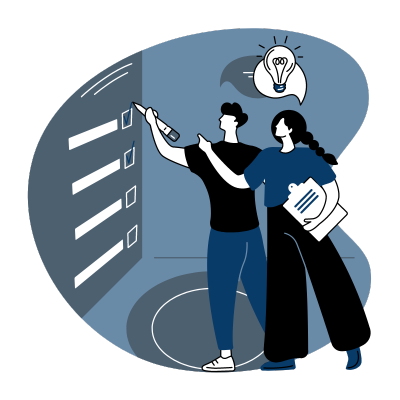
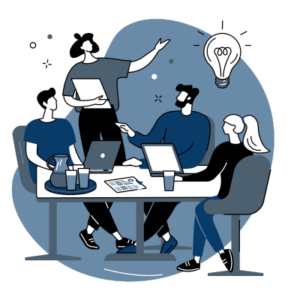


 back and make a meaningful impact. Promoting drop off location on the library calendar makes it simple for donors to make their donations.
back and make a meaningful impact. Promoting drop off location on the library calendar makes it simple for donors to make their donations.

